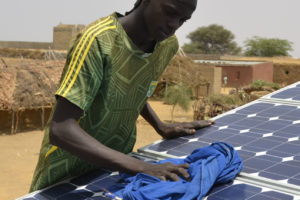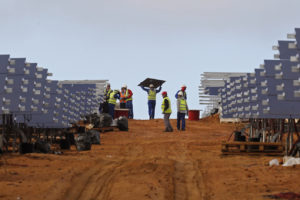The second Solar and Off-Grid Renewables West Africa event in Ghana in April heard mixed views on the progress of solar in the region. But with the first projects reaching completion and others moving forward, brighter times seem to be around the corner. Tom Kenning reports.
Despite the commissioning of the largest solar PV plant in West Africa this year, the total installed capacity in the region stands at a scanty total of 33MW. The sector has continued to be held back by lengthy delays in the early stages of project development, high costs of capital and the poor financial health of major utilities. However, a host of ongoing government tenders may have paved the way for genuine movement in the coming two years. Meanwhile, the region’s long-standing power deficits continue to uphold a strong case for solar deployment. PV Tech attended this year’s Solar and Off-grid Renewables West Africa conference in Accra, Ghana, for an insight into the region’s utility-scale solar ambitions.
One year ago, many hopes lay in Ghana as the torch-bearer for solar in West Africa but the introduction last April of a 20MW cap on project sizes by the government and persistent off-taker issues have hampered progress. Instead, it was Nigeria that took centre stage this year by showcasing multiple large-scale projects in its pipeline and a significantly higher solar target than any of its neighbours, set at 1,343MW by 2020 – well above Mali’s goal of 308MW and Ghana’s 218MW. Grid constraints will be a major barrier to large-scale solar in several West African countries, but Nigeria should be able to cope for some time.
“Nigeria’s grid can take 1GW of solar with no issue. Come 2GW it will require some structural readjustments to accommodate it,” says Longe Yesufu Alonge, head of power procurement and power contracts at state-owned body Nigerian Bulk Electricity Trading (NBET).
Meanwhile the submission to parliament of Nigeria’s National Renewable Energy and Energy Efficiency Policy for passage into law is a major step for large-scale deployment of renewable energy in the country, adds Abubakar Sani Sambo, chairman of the Nigerian Member Committee of the World Energy Council (WEC). If passed, the law would help create an energy development fund to incentivise use of renewables and support Nigeria’s feed-in tariff.
Sambo also lists a host of large-scale projects under consideration in the country including Canadian developer SkyPower Global and Saudi-based FAS Energy’s plans to build 3GW of PV in Delta State, having signed agreements with state and federal governments for the US$5 billion project. Meanwhile, two other US companies signed agreements with the Nigerian government for 1.2GW in different regions for US$2 billion. French oil company Total also intends to build 1GW of projects.
Nevertheless, despite an extensive list of large-scale projects in development, including around nine projects of 50-100MW capacity, Janos Bonta, senior investment officer, structured finance energy of Dutch development bank, FMO, says there are substantial challenges in negotiating power purchase agreements (PPAs).
“Nigeria is a big market with multiple initiatives,” says Bonta. “Nevertheless we followed the market for many years. Projects are delaying and PPA negotiation is quite painful and long, and it makes projects very expensive.”
Due to the build-up of delayed projects awaiting contracts, Nigeria is unlikely to start any tendering process until late next year, says Justin Woodward, co-founder and chief development officer of JCM Capital. Furthermore, if approaching Nigeria as a new developer, it can also take a long time to standardise procedures around contracts, as there is inconsistency in the regulation at present, he adds.
Other issues highlighted by delegates include the fact that while solar resources are highly favourable to projects in the north of Nigeria, many of these locations carry a security risk. Furthermore, the cost and difficulty of acquiring land varies from state to state, calling for due diligence, patience and management of expectations.
Another key issue is the high cost of financing, which is part of the reason why long PPA negotiations make projects even more expensive.
Large-scale outlook
Looking at the wider African region solar resources are plentiful, but the speed of progress will not be uniform across the countries. This has given rise to innovative proposals such as using solar for cross-border energy trading between the West African Power Pool (WAPP). According to a report launched at the event by the United Nations Environment Programme (UNEP), multiple PV plants located within 5km of the grid in Ghana could have their energy exported to neighbouring countries in order help integrate the intermittent power coming into the grid.
Interest in the large-scale market is growing, says Bonta, as it is complementary to base load during peak hours and it can be realised in remote areas with a shortage of power relatively quickly compared to other technologies. However pricing remains on the high side.
“In order to be successful in developing solar at minimal cost and optimal speed, scale, standardisation and competition are required,” says Edore Onomakpome, investment officer at the International Finance Corporation (IFC).
This means projects of greater capacity than 25MW must be installed to improve the wider market conditions. It also requires establishing bankable contract template documents that will effectively reduce the overall transactional cost for developing these projects, she adds. Meanwhile, greater competition between developers is necessary to bring down tariffs. Such competition also requires a certain level of transparency.
“When you are navigating small grids and small projects, it becomes extremely expensive and quite inefficient to attract the large-scale developers that are necessary to drive down costs,” says Onomakpome.
Ghana
Contracts for larger projects in Ghana, for example, were being negotiated on a one-on-one, project-by-project basis, which limits the transparency and the level of competition in the contract signing, which again drives up costs.
Onomakpome also says that Ghana suffers from an oversupply of brokers, without experience or strong balance sheets, who are focused on developing as many projects as possible and then flipping them to the larger developers at a premium – usually for around 20-30% of the overall project cost. “Ghana does have its thinking cap on and is walking in the right direction, but there is still a lot to go,” she says.
The multiple hurdles left for the Ghana market may seem odd, given that it saw the largest solar project in the region come online this year. The 20MW plant built by China-based power firm BXC Ghana, a subsidiary of Beijing Fuxing Xiao-Cheng Electronic Technology, should have been a strong milestone for large-scale PV development. However, Wisdom Ahiataku-Togobo, director of renewables and alternative energy at the Ministry of Power Ghana, cites the fact that BXC had funded the plant without credit enhancement from the government, claiming it was “unfortunate” that most other developers do look for such supports and must be subjected to competitive tender processes instead.
Ghana even saw the launch of a 30MW PV module manufacturing plant in Kpone, a commercial hub just outside Accra. The facility, developed by Strategic Power Solutions, a subsidiary of Strategic Security Systems International (3SIL), is totally unique to the region and suggests an expectation of demand in the coming years.
In any case, the period of time necessary to carry out PV projects remains long and debilitating. None of the hopeful projects last year have moved forward, says Bonta, because government has changed its policies and is not willing to give the necessary guarantees. This comes partly as a result of the weak off-taker, the nation’s main utility Electricity Company of Ghana (ECG) (see box, previous page).
To add to the concern, Ghana’s power sector has been in crisis for several years, after its generation dropped drastically and has made blackouts incessant since 2012, when the term “dumsor”, meaning “off-on” became a popular household saying.
“The way going forward is actually very difficult for developers and slow,” says Bonta. Ghana has seen multiple initiatives delayed due to off-take risk, uncertainty on liquidity, termination risk, grid capacity and unclear policy on project capacity caps. Nevertheless, Bonta says FMO is more optimistic about certain projects going forward.
Governments’ progress
Solar is not the sole preserve of Ghana and Nigeria of course, with Bonta singling out the Ivory Coast as having a particularly good private power framework in place, where the government is willing to give guarantees for the off-take risk, which streamlines the development of projects. Meanwhile, Mali, Burkina Faso, Benin and Senegal all have several early-stage initiatives with potential.
Promising tender processes are at various stages in several countries, says Mahama Kappiah, executive director of the Economic Community of West African States (ECOWAS) Regional Centre for Renewable Energy and Energy Efficiency (ECREEE). This includes a completed tender for two projects of up to 75MW in Mali, five projects up to 67.5MW in Burkina Faso and one project of 10MW in Togo.
“The ultimate goal is a tender process,” adds Woodward. “It will drive the tariffs down in the future.”
Clean energy corridors with a combined capacity of 2GW are also being planned for the West African region under plans put forward by ECREEE. Kappiah says the corridor will involve connecting many 10-15MW solar PV plants, as well many other technologies such as wind and hydro.
Meanwhile, many new projects including larger-scale projects are in the pipeline, some of which were initiated by government IPP tenders.
Gambia Ghana and Nigeria have also introduced or are planning to introduce feed-in tariffs for renewable energy, says Kappiah, but this has brought limited results so far. Meanwhile Cape Verde, Gambia, Ghana and Senegal have seen limited uptake of their net metering schemes.
The outlook for solar in West Africa is clearly mixed, but there is a sense that some projects that have been in development for several years may start coming up in the next two years. Progress remains slow and market will need more competition to really take off.



